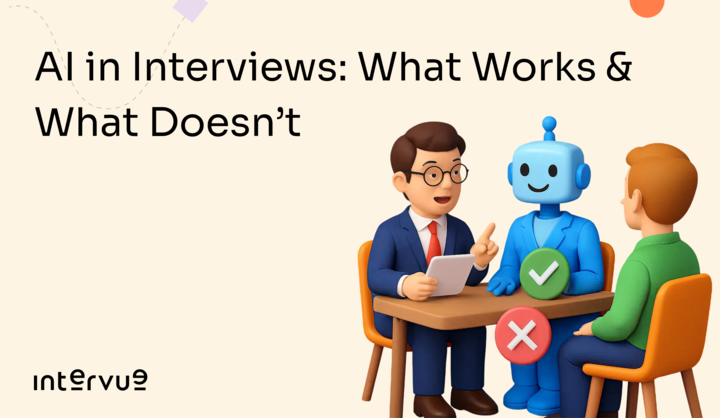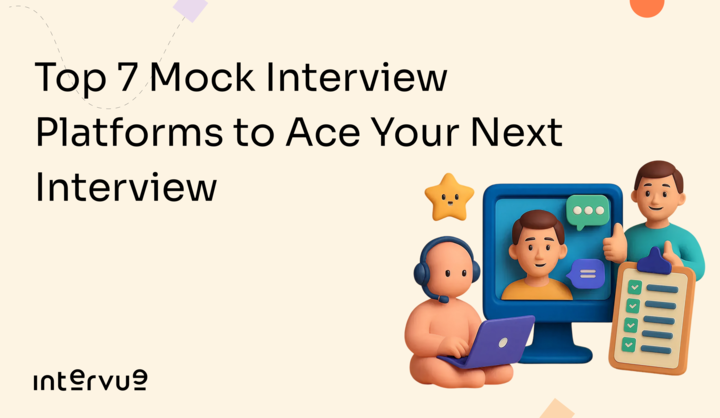The role of data-driven interview feedback in improving hiring outcomes
According to Deloitte’s experience, cognitive ability tests and structured assessments increased hiring efficiency by 60% while significantly improving retention and performance.

Hiring the right people is one of the most important things a company does. But most teams still rely on gut feelings and vague notes when it comes to interviews. That might work sometimes, but more often than not, it leads to missed opportunities or bad hires.
That’s where data-driven interview feedback makes a big difference. It’s a way to bring structure, clarity, and fairness to how you evaluate candidates—so your hiring decisions are based on facts, not just opinions.
In this article, we’ll break down what data-driven feedback really means, why it matters, and how it helps you hire faster and better.
What is data-driven interview feedback?
It’s exactly what it sounds like: collecting feedback from interviews in a structured, measurable way.
Instead of random comments like “seems smart” or “felt like a good fit,” you use clear scoring, defined criteria, and shared rubrics. You focus on how well someone did in areas that matter like coding skills, communication, or problem-solving not on how confident they seemed.
For example, using a tool like Intervue.io, interviewers can score candidates on different skills, write comments that are easy to understand, and keep everything in one place for hiring managers to review.
The problem with traditional interview feedback
Most companies still rely on free-form notes, memory, or Slack messages to give feedback. That leads to a few big problems:
- Inconsistency: Different interviewers judge candidates in different ways.
- Bias: Personal opinions or first impressions can influence the final decision.
- Delays: Managers wait for feedback that comes in late or doesn’t make sense.
- No way to improve: There's no history or data to learn from.
In short, it’s messy. And messy hiring leads to the wrong people getting hired or good ones being overlooked.
5 Ways data-driven feedback improves hiring
Let’s look at how data-backed feedback makes hiring simpler, faster, and more accurate.
1. Reduces bias
According to Deloitte’s experience, cognitive ability tests and structured assessments increased hiring efficiency by 60% while significantly improving retention and performance.
When everyone uses the same evaluation criteria, personal opinions matter less. You're rating real skills, not whether the candidate went to a top school or “clicked” with the interviewer.
For example, when evaluating a developer, you can focus on things like:
- Code correctness
- Efficiency
- Problem-solving approach
- Communication
Intervue.io helps you do this in a structured way, so every candidate gets a fair shot regardless of their background.
2. Helps you choose the right person
Traditional interviews often vary widely in quality due to interviewer experience or mood. Structured feedback gives you clearer comparisons between candidates. You can look at scores and comments side by side, rather than trying to remember how someone made you feel.
Research shows that structured interviews are almost twice as accurate at predicting job success compared to casual conversations. With the right data, you make better decisions.
3. Makes hiring faster
One of the biggest slowdowns in hiring is waiting for interviewers to send in their notes or trying to understand vague feedback.
Data-driven insights enable recruiters to quickly identify top candidates and eliminate unqualified ones early in the funnel. This reduces the time spent on subjective deliberations and lengthy interview rounds.
By automating feedback collection and analysis, platforms like Intervue.io. Platforms like Intervue.io automate feedback collection and analysis, helping
No more back-and-forth. No more confusion.
4. Keeps interviewers aligned
Candidates appreciate transparent and structured interview processes. Every interviewer has their own style. Some are tough. Some are generous. Without tracking this, it’s hard to trust the scores.
Data-driven tools let you see how different interviewers score candidates over time. If someone always gives low scores while others are more balanced, you’ll know and can adjust or provide training.
That way, your interviews become more consistent and fair.
Structured interviews also reduce candidate anxiety by setting clear expectations and consistent evaluation criteria.
5. Helps you improve the process over time
The more interviews you run with structured feedback, the more data you have to learn from.
You can ask:
- Are some interview questions better at spotting strong hires?
- Do certain skills predict on-the-job success?
- Are we spending too much time in certain interview rounds?
This kind of insight helps you fine-tune your hiring process and make it more effective over time.
Real example: How Intervue.io helps
Let’s say you’re hiring a backend developer. With Intervue.io, your team can:
- Use Standardized Rubrics: Develop clear scoring criteria aligned with job requirements to evaluate technical skills, problem-solving, communication, and cultural fit consistently.
- Leverage Technology: This platform employs that combine expert interviewers with analytics and automated reporting.
- Collect Multi-Dimensional Data: Include coding tests, behavioural interviews, and situational judgment assessments for a holistic view.
- Analyze and Calibrate: Regularly review interview data and recordings to calibrate scoring and improve hiring accuracy.
- Solicit Candidate Feedback: Use surveys to gather candidate experience data and refine the process continuously.
It’s simple, repeatable, and saves hours of confusion. Plus, it keeps everyone aligned.
Common concerns and the reality
Concern: This will take more time.
Reality: It actually saves time by making feedback faster and easier to review.
Concern: I don’t want to rely only on numbers.
Reality: You still use human judgment just with better information.
Concern: Every interview is different.
Reality: True, but the skills you're evaluating stay the same. That’s what you score.
Why this matters in today’s time?
Hiring today is hard. There’s more competition for talent, and the cost of making a bad hire is high.
When decisions are based on notes and opinions, mistakes happen. But when you use structured feedback, you make smarter calls. You save time, reduce bias, and improve the chances of finding someone who will succeed in the role.
It’s not about replacing people with numbers—it’s about helping people make better decisions, backed by data.
Final Thoughts
You can’t build a great team without a great hiring process. And you can’t improve your process without clear, structured feedback.
Data-driven interview feedback takes the guesswork out of hiring. It brings clarity to every step. It helps you make decisions you can stand by based on what really matters.
With Intervue.io, hiring becomes more than just interviews. It becomes a system that helps you grow with confidence.
Want to make better hires, faster?
Try Intervue.io to structure your interviews, capture real-time feedback, and hire smarter. Book a demo
FAQs
Q1. What makes interview feedback data-driven?
It is based on standardized scoring rubrics, objective metrics, and analytics rather than subjective opinions.
Q2. How does data-driven feedback reduce hiring bias?
By focusing on measurable skills and behaviors and using consistent evaluation criteria, it minimizes unconscious bias related to demographics or background.
Q3. Can data-driven feedback speed up hiring?
Yes, it helps quickly identify top candidates and reduces time spent on subjective deliberations, accelerating the hiring cycle.
Q4. How does Intervue.io support data-driven interview feedback?
Intervue.io provides expert interviewers, rubric-based scoring,analytics, and interview recordings for detailed, objective candidate evaluations.
Q5. Is data-driven feedback suitable for all technical roles?
Yes, it can be customized to assess a wide range of skills across software engineering, data science, product management, and more.
Q6. How can companies use data to improve their hiring process over time?
By analyzing aggregated interview data to identify skill gaps, interviewer inconsistencies, and candidate experience issues, companies can continuously refine their recruitment strategies.




